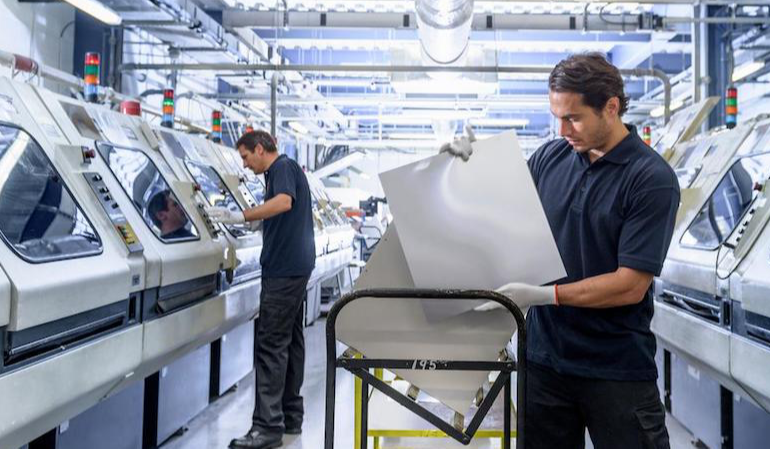How To Get More from Your Manufacturing Operations
Reaching production goals in a manufacturing business can seem like a continuous losing battle....

Manufacturing Execution Systems (MES) are highly powerful automated systems deployed in manufacturing to track the transformation of raw material to finished product in your production line. MES keeps up with your production process in real-time and is used to optimize all aspects of your production line.

OEE scores are probably one of your most important top-level metrics. An MES gives you actionable insights into quality, performance and availability details with the aim of maximizing each category.
There are a number of factors that could modify ratios of usable products coming off of your production line. And integrated solution allows you to look at every step of your process for possible quality control opportunities.
MES provides insights into both sides of the performance metric. On the planning side, you can get the information you need to create the most productive line and change the layout when necessary. On the practice side, you can keep track of order execution and resource scheduling to get as close to the theoretical goal as possible.
Through enhanced reports powered by integration with order execution and product definitions, an MES can help increase your availability score. Getting these step-by-step reports back from the floor has several advantages. Correlating loss events with other data could inform scheduling of maintenance and identify problem resources, for example. It all goes towards decreasing the frequency of the specific type of unscheduled downtime you're experiencing.
The right information can help you climb to the top of your industry in OEE scores.
Your products undoubtedly undergo complex transformations, but everything starts with the materials. Understanding their status during every step of the process allows you to keep better records for inventory control, quality standards compliance and any number of other functions.
MES track-and-trace functions give you the oversight you need to understand where your materials are going and what is happening to them every step of the way. This granular data provides direct support for other functions, such as OEE scoring and resource scheduling, to help inform decisions about resource commitment, order timing and other enterprise-level concerns.
From intake to finished product, tracking and tracing with an MES lets you tell a detailed story about what happens to each of your materials. See how Intraratio solutions could integrate into your system by scheduling a demo now.
Manufacturing managers need to define the processes necessary to complete orders in a set amount of time, either working forward from the day materials are received or backward from a due date. Order execution planning and the scheduling control element, order dispatch, typically happen at the MES level.
When things don't go exactly according to schedule, your plan might need to change across your enterprise. Lower-than-expected efficiency, longer maintenance times or a steep learning curve could all have an effect on whether orders come through on time.
You need to make the right changes as soon as possible to prevent production delays. That's where MES comes in.
Real-time reporting allows you to manage production and provides a top-level, updated view of order scheduling and execution as information comes back from the floor. If things are going slower than expected, data from MES would suggest which action you need to take to make your goals, such as retraining or increasing resource commitments.
Accurate order execution makes happy clients. Book a demo today to see what MES tools can add to your production management practice.
Anyone who is involved with a growing manufacturing enterprise knows that higher production and competitive pricing can threaten quality. An MES lets you keep track of custom product quality metrics and compare them to other elements of production.
Product quality is about more than just satisfying customers in highly regulated industries, such as chemical, pharmaceutical and food manufacturing. Through integration with resource scheduling, product definition and other systems, an MES can inform quality improvement decisions about every aspect of production:
Then, you can track the effect of your changes in real time as information comes back from the production floor. You can also push the MES data out to other systems.
An MES allows integration with other important systems, such as MRP, MRP II and ERP. It scales up seamlessly to multiple work centers, creating enterprise-wide quality oversight and control. See what a customized management and tracking system could do for you by scheduling a demo today.
Resource management is critically important to manufacturing. After all, your orders won't get filled on time if you don't have adequate levels of material, equipment or labor resources.
An MES provides a framework for oversight and analysis of resource scheduling and control.
Here are a few of the specific things these systems can do for your manufacturing enterprise:
The closer you are to real-time reporting with this data, the better control you have over your inventory tracking and consumption. Intraratio has an innovative step-by-step system that lets you see exactly when each material is consumed.
As with other functions of an MES, you can communicate resource scheduling and inventory control information easily across enterprises. It can also feed into MRP, MRP II and ERP systems.
Evaluating MES options to meet your company’s unique needs is crucial. Here are the facets of MES technology that need to be considered:
Serialized Traceability is Driving Real Change
Cloud and On-Premise Manufacturing Execution System
Integration: ERP Systems and MES Working Together for Greater Output
As digitization has taken root in manufacturing over the last few decades, two particular types of systems that overlap in functionality but maintain distinct purposes have garnered attention and debate: Enterprise Resource Planning (ERP) and the Manufacturing Execution System (MES).
Exploring the core functions of each of these applications can help decision makers determine whether one of these systems or the other, or both working.
MES provides the digital backbone for Industry 4.0 and the Intelligent Enterprise.
Intraratio can help you discover the power of MES and yield management systems for your manufacturing process. Arrange now to speak with an MES expert who can guide you through the ins and outs of customizing an advanced solution for your operation.
3 Things To Think About When Choosing Between an ERP or MES System - If you are trying to decide between an MES or ERP solution, you will want to provide answers to the following questions before making your final choice.
Overall Equipment Effectiveness (OEE): Driving Factory Continuous Improvement - Learn more on how manufacturers who utilize OEE metrics see great returns in production efficiency and effectiveness.
Eliminate Manual Data Collection in Manufacturing - Many manufacturers, realizing the inefficiencies of paper, are making steps toward digitization. Learn with us what you need to evaluate when going digital.
Traceability for Surface Mount Technology (SMT) Process - Enhance SMT efficiency and quality with traceability. Learn how barcode scanners, data logging, MES, standardization, and training drive success
Reaching production goals in a manufacturing business can seem like a continuous losing battle....
The days of standing next to a process with a stopwatch to calculate cycle times are now a distant...
In the vast realm of manufacturing, perfection at the first go isn't always a given. The process...